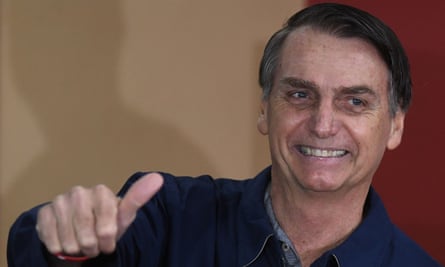The far-right favourite to become Brazil’s next president has vowed to spearhead a historic purge of his leftwing political foes in a menacing address that delighted supporters and left opponents outraged and unnerved.
Jair Bolsonaro looks set for a landslide victory over his Workers’ party (PT) rival Fernando Haddad when the world’s fourth-largest democracy returns to the polls on Sunday for the decisive second round of its presidential election. Latest polls give him an 18-point lead over Haddad.
In a confrontational video address to supporters on Sunday, the pro-torture former paratrooper pledged to use the presidency to launch a frontal assault on his “red” political rivals.
“Either they go overseas, or they go to jail,” Bolsonaro told thousands of cheering supporters who had packed Avenida Paulista, one of São Paulo’s main arteries, for one of his final campaign acts.
“These red outlaws will be banished from our homeland. It will be a cleanup the likes of which has never been seen in Brazilian history,” Bolsonaro declared in his 10-minute address by videolink from his home in Rio de Janeiro, where he has been recovering following a near-fatal assassination attempt last month.

“Crooks” from Brazil’s landless workers movement (MST) would be designated as terrorists, Bolsonaro vowed, while the leftist former president Luiz Inácio Lula da Silva – whom he mocked as a “drunkard” – would be left “to rot in jail”, along with other top PT politicians, including Haddad.
“We are the majority. We are the true Brazil. Together with this Brazilian people we will build a new nation,” Bolsonaro declared, later adding: “We are the voice of freedom … We do not want socialism.”
Euphoric Bolsonaro supporters, many of them wearing the yellow and green of Brazil’s national flag, cheered the oration with chants of “Brazil, Brazil, Brazil, Brazil!” and their leader’s nickname: “Legend! Legend! Legend! Legend!”
Progressive Brazilians and members of its left, who fear Bolsonaro could plunge their country back into authoritarianism, were aghast by the incendiary words of their likely next president, who is notorious for his hate-filled rhetoric.
Quick GuideBrazil's dictatorship 1964-1985
Show
How did it begin?
Brazil’s leftist president, João Goulart, was toppled in a coup in April 1964. General Humberto Castelo Branco became leader, political parties were banned, and the country was plunged into 21 years of military rule.
The repression intensified under Castelo Branco’s hardline successor, Artur da Costa e Silva, who took power in 1967. He was responsible for a notorious decree called AI-5 that gave him wide ranging dictatorial powers and kicked off the so-called “anos de chumbo” (years of lead), a bleak period of tyranny and violence which would last until 1974.
What happened during the dictatorship?
Supporters of Brazil’s 1964-1985 military regime - including Jair Bolsonaro - credit it with bringing security and stability to the South American country and masterminding a decade-long economic “miracle”.
It also pushed ahead with several pharaonic infrastructure projects including the still unfinished Trans-Amazonian highway and the eight-mile bridge across Rio’s Guanabara bay.
But the regime, while less notoriously violent than those in Argentina and Chile, was also responsible for murdering or killing hundreds of its opponents and imprisoning thousands more. Among those jailed and tortured were Brazil’s first female president, Dilma Rousseff, then a leftwing rebel.
It was also a period of severe censorship. Some of Brazil’s best-loved musicians - including Gilberto Gil, Chico Buarque and Caetano Veloso - went into exile in Europe, writing songs about their enforced departures.
How did it end?
Political exiles began returning to Brazil in 1979 after an amnesty law was passed that began to pave the way for the return of democracy.
But the pro-democracy “Diretas Já” (Direct elections now!) movement only hit its stride in 1984 with a series of vast and historic street rallies in cities such as Rio de Janeiro, São Paulo and Belo Horizonte.
Civilian rule returned the following year and a new constitution was introduced in 1988. The following year Brazil held its first direct presidential election in nearly three decades.
“Brasil, ame-o ou deixe-o,” tweeted Cynara Menezes, a Brazilian journalist – a reference to the infamous slogan of its 1964-85 dictatorship. “Brazil, love it or leave it.”
BRASIL, AME-O OU DEIXE-O
— cynara menezes (@cynaramenezes) October 22, 2018
candidato de extrema-direita à presidência do brasil ameaça opositores com banimento. "ou vai para fora ou vai para a cadeia" pic.twitter.com/Ig27eTIuSU
Guilherme Boulos, a young leftist politician some call Lula’s heir, described Bolsonaro’s speech as “typical of an authoritarian and dictatorial mind”.
“We will push on with the democratic resistance,” Boulos vowed.
Haddad tweeted: “Bolsonaro has threatened the survival of his opponents … We must defend the democratic rule-of-law. How can people feel safe if he threatens those who think differently to him?”
One distraught Brazilian voter used Facebook to urge friends to think again before Sunday’s election. “Everyone who votes for him or spoils their vote will have blood on their hands,” she wrote.
Lilia Schwarcz, a Brazilian historian and writer who witnessed Bolsonaro’s address as she left an art gallery near Sunday’s rally, said she had been disturbed by his inflammatory rhetoric.
“The way he spoke … he is asking people to be violent – this is not democracy,” Schwarcz said.
“He speaks like a very authoritarian leader – it reminds us of other regimes … We know this film. We know this kind of movie. It is a very authoritarian one.”
José Roberto de Toledo, a political journalist from the magazine Piauí, said: “It’s an escalation. As Mussolini would say: ‘If you pluck a chicken one feather at a time, people don’t notice.’”
